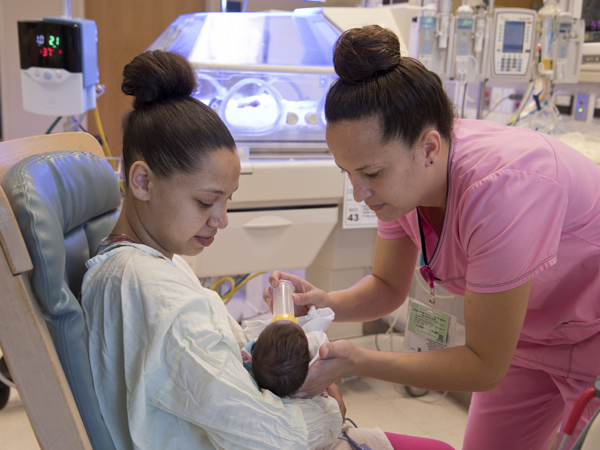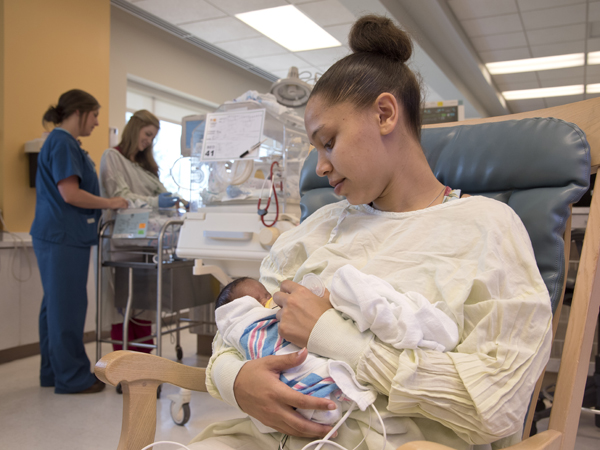Collaborative brings state's clinicians together for mothers, babies

If Mississippi is ever to vacate the last spot on several health rankings reports, everyone needs to work together.
This basic premise is behind a new collaboration launched by the Mississippi State Department of Health in partnership with Mississippi birthing facilities, medical providers and public health professionals, including University of Mississippi Medical Center clinicians. It aims to positively impact health outcomes for mothers and babies.
The Mississippi Perinatal Quality Collaborative (MSPQC) hopes to lower the state's perennially high prematurity, infant mortality and pregnancy-related mortality rates by standardizing and improving the quality of care mothers and babies receive, no matter where they live.

"Our decision was to try and start a collaborative that would bring together members from top to bottom of the state who care for pregnant women and their babies, specifically UMMC and as many hospitals as deliver OB care as possible," said Dr. James Shwayder, chair of obstetrics and gynecology.
To take on the Herculean effort, UMMC specialists on all sides of childbirth - obstetricians, pediatricians, neonatologists and maternal fetal medicine specialists - will work together with their colleagues from other health-care facilities, as well as the Department of Health, insurance companies and other public health entities throughout the state.

Dr. Renate Savich, professor of pediatrics and chief of the Division of Newborn Medicine, said the large scale and reach of the MSPQC is designed to help the areas of Mississippi that need it the most.
"We might do fine here in Jackson, but if we don't pay attention to the Delta and other areas, we're never going to do better in Mississippi," she said. "It really is thinking about medical care outside your own institution - how can we make the state better?"

Dr. Charlene Collier, who has a joint position with the State Department of Health and the Department of Obstetrics and Gynecology, serves as director of the MSPQC. She said the idea is to promote partnerships across all birthing facilities to collectively and simultaneously address the greatest threats to maternal and infant health using evidence-based practices.
"By addressing infant and maternal mortality as a state, we can learn from one another, share resources and hopefully make a greater impact on improving birth outcomes than any single provider or hospital could do alone," Collier said.
For the past few months, the group has been selecting areas to focus on that were likely to improve the health of mothers and babies.
For mothers, the group is looking at managing severe hypertension. For babies, the group of neonatologists from throughout the state is concentrating on care during the "golden hour," or the first hour of life for babies born prematurely.
"You can't do either one of these in isolation. They're all critically important," Shwayder said.
Savich agreed.

"We have to work together with our obstetrical colleagues to improve outcomes, because we can be the best NICU in the world, but if we continue to get these tiny, tiny babies, we're not going to get better," she said. "So we need to really look at the maternal side of things."
"Once the initiatives were decided, we are developing toolkits, or basically ways to manage these situations, that are consistent and evidence-based," Shwayder said.
For premature babies, the first hour of life is critical, according to Savich.
"We need to get everything started in that first hour and then allow them to rest," she said.
Premature babies need to be warm and they need support for their lungs and IV fluids. The checklist for this initiative includes items such as the baby's temperature and how much oxygen is being used.
For hypertensive mothers, the emphasis is on preparing for an emergency situation, recognizing the acuity of the situation and escalating the level of care or transporting the patient as needed.
"Hopefully, what we'll do then is establish something where if they remain at their home hospital, they will get quality evidence-based care, and if they reach a point where they need a higher level of care, then that's already in our toolkit and it can be measured in that regard," Shwayder said.
The toolkit contains standards for early warning signs of severe hypertension, uniform protocols for measuring the mothers' blood pressure and urine protein, and escalation measures for those mothers who do not respond to standard treatment.
These toolkits will be instituted at birthing hospitals across the state. Caregivers will collect data as dictated by the toolkit for each severely hypertensive mother and during the babies' "golden hour."
The data for mothers and babies will be sent to the Department of Health, where it will be analyzed. After a few months, the group will convene again to discuss what worked and what didn't and which facilities are having success. Best practices will be gleaned from the data and the Department of Health will disseminate those throughout the state.
Once these initiatives experience some success, the group will choose the next projects.
"It's a really organized, systematic way to continually get better and make improvement," Savich said. "The idea is we're just going to keep going through and finding projects that we can do better."
This collaborative effort is part of a larger trend towards improving infant, maternal and perinatal mortality rates that was originally spearheaded by the Centers for Disease Control. Shwayder said multiple states that have been doing it for a while have really found an improvement in these rates.
"When you look at, say, California, their perinatal mortality/morbidity dramatically dropped," he said. "It was a remarkable change."
Because well-established collaboratives are offering up their checklists and toolkits, states like Mississippi don't have to reinvent the wheel to get started. It gives Mississippi a jump-start in the process, but the initiatives and the toolkits and checklists will be continually changing, Savich said.
"We all understand this is the way you need to look at medicine - quality improvement," she said. "It's not a randomized controlled trial to see what it better; it is that what we know works and we are making changes based on best practices. Collect your data, say 'we can still do better, let's make this change,' and you keep looking and you keep getting better and better and better.
"All of the providers in the state are volunteering their time in this effort, because they feel it is important to make things better in Mississippi. It is also an opportunity to work closely with obstetricians throughout the state to improve the care for mother and baby together."
As the facilitator for the collaborative, Department of Health staff hope it will serve as a springboard for other projects targeting the state's infamously poor health outcomes.
"We're starting with these smaller numbers of initiatives with the hopes of gaining the skills of sharing data, collecting data, monitoring our progress toward specific goals and then, hopefully, we can apply that process of collaborative learning to other projects," Collier said.
Shwayder thinks the effects of the MSPQC will improve the overall health of the state as well.
"If we make a difference at the very beginning of a baby's life, it will translate into incredible differences in health later on in its life," he said.


